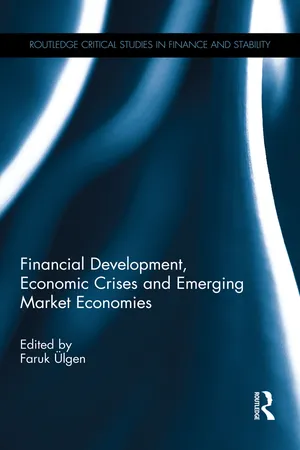
- 244 pages
- English
- PDF
- Available on iOS & Android
Financial Development, Economic Crises and Emerging Market Economies
About This Book
Recurrent crises in emerging markets and in advanced economies in the last decades cast doubt about the ability of financial liberalization to meet the aims of sustainable economic growth and development. The increasing importance of financial markets and financial efficiency criterion over economic decisions and policies since the 1980s laid down the conditions of the development process of emerging market economies. Numerous crises experienced thereafter gave rise to flourishing work on the links between financialization and economic development. Several decades of observations and lessons can now be integrated into economic and econometric models to give more sophisticated and multivariable approaches to financial development with respect to growth and development issues. In the markets-based and private-enterprise dominated world economy, two conditions for a successful growth-enhancing financial evolution can at least be brought fore: macroeconomic stability and consistent supervision.
But even after the 2007-2008 global crisis, economists do not agree on the meaning of those conditions. For liberal and equilibrium-market economists, good finance and supervision mean market-friendly structures while for institutionalists, post-Keynesian and Marxist economists, good finance and supervision must lie in collectively designed and managed public structures. Drawing heavily on the tumultuous crises of the 1990s-2000s, this book argues that those experiences can shed light on such a crucial issue and lead economic theory and policy to go beyond the blindness of efficient free markets doctrine to economic catastrophes. It also points to new challenges to global stability in the wake of reconfiguration of international financial arena under the weight of major emerging market economies.
Frequently asked questions
Table of contents
- Cover
- Half Title
- Title Page
- Copyright Page
- Table of Contents
- List of figures
- List of tables
- List of contributors
- Foreword
- Introduction: financial development: the sword of Damocles hanging over the process of economic development
- 1 Financial liberalization, crises and policy implications
- 2 Global financing: a bad medicine for developing countries
- 3 Financial development, instability and some confused equations
- 4 Underdeveloped financial markets’ infrastructure of emerging market economies: assessment of underlying challenges and suggested policy responses
- 5 Towards de-financialization
- 6 A common currency for the common good
- 7 A capital market without banks: lending and borrowing in Hennaarderadeel, Friesland, 1537–1555
- 8 Financial liberalization, financial development and instability in emerging economies: what lessons for the franc zone?
- 9 Depositor myopia and banking sector behaviour
- 10 Dollarization and financial development: the experience of Latin American countries
- 11 Financialization in Brazil: a paper tiger, with atomic teeth?
- 12 National and supra-national financial regulatory architecture: transformations of the Russian financial system in the post-Soviet period
- 13 Minsky in Beijing: shadow banking, credit expansion and debt accumulation in China
- Index